As mentioned elsewhere, there has been welcome news that the European Council presidency and European Parliament negotiators reached provisional agreement on a set of revisions for the regulations on drivers’ hours for coach tourism in the EU.
Although this does not apply in the UK, it assists those who have been advocating change that there are some sensible proposals out there. The UK coach trade bodies, including RHA, CTA, UKCOA and the Confederation of Passenger Transport, have been lobbying on these issues for some time now.
In summary, the proposed changes (which need formal ratification) are as follows:
- Permit drivers to split their 45-minute breaks from driving into two periods each of at least 15 minutes
- Allow drivers to postpone commencement of a daily rest period by one hour once per trip, provided that the accumulated driving time for that day does not exceed seven hours
- Give an option for drivers to utilise their 12-day dispensation from commencing a weekly rest on domestic tours.
This is all sensible stuff, and gives coach drivers and operators some flexibility to cope with day-to-day issues that inevitably arise, or for which there are limited practical cost-effective alternatives.
Life does not come neatly packaged, allowing you to run a perfect service day after day. There are road traffic accidents, unscheduled roadworks, sickness (for both passengers and staff), weather, and a mountain of other incidents can disrupt even the most meticulously planned excursions or tours. While allowances can be made for the unexpected, the unexpected often occurs in a way or place that defies prediction.
How many among us have received a call from a driver indicating they are about to run out of driving time because of the struggle to find a parking space in a city centre? And how often has the distance between towns, especially on a tour, meant a journey cannot be completed with just a single driver, however marginal the duration of the exceeded time limit?
We are advocating for incremental changes that enhance flexibility, when necessary, without undermining safety standards. It is also imperative to establish a regulatory framework that is more understandable and minimises the risk of non-compliance due to misinterpretation.
A simplified and universally understood set of domestic drivers’ hours regulations, incorporating that flexibility, is surely something we all want to see.
These adjustments would also play a role in attracting new talent to the sector. The inaugural meeting of UKCOA’s Women in Bus and Coach subgroup earlier this month highlighted the importance of adapting driving roles to accommodate individuals with caregiving responsibilities. This doesn’t necessarily require substantial changes to drivers’ hours rules, but emphasises the importance of flexibility. The needs of younger drivers should also be addressed, possibly necessitating other regulatory revisions.
So, the proposed reforms from Europe are indeed welcome and eagerly anticipated. The question now is: What measures can we undertake within the UK to align with, or enhance, these changes?

























